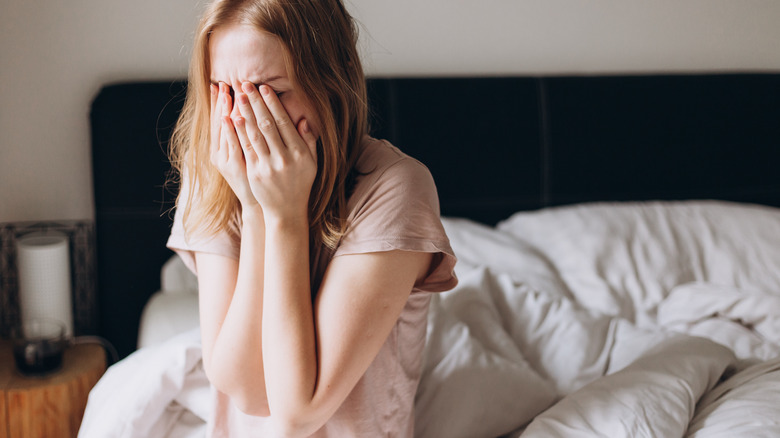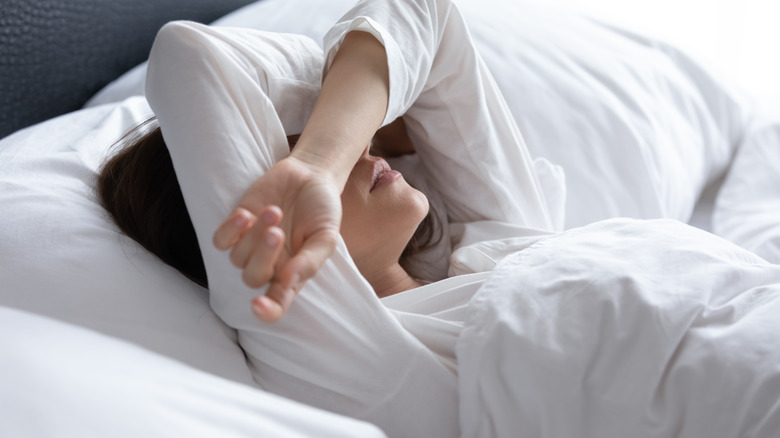How To Get Rid Of Migraines
Migraine attacks are debilitating. When you suffer from migraines, you experience a slew of symptoms in addition to an intense headache. According to Healthline, migraines can be accompanied by nausea, sensitivity to sound and light, and vomiting, depending on the severity of the attack. If you're unsure whether you're experiencing a headache or a migraine, an easy way to differentiate between the two is to determine where the pain is located. A headache is felt in multiple locations in your head, whereas migraines typically radiate pain from behind your eyes.
As migraine sufferers, we know how difficult it can be to manage the pain and to rid yourself of the migraine once it has started. It's important to have a treatment plan in place to prevent the attack from occurring whenever possible, such as establishing a consistent sleep schedule, staying hydrated, and managing your stress properly (per the Mayo Clinic). When these processes fail, there are a few options available to help you get rid of your migraine.
Managing your migraines is a trial-and-error process, as certain solutions work better for some people than others. Start by trying the options outlined below to get rid of migraines more easily and effectively.
Establish a calm environment as soon as your migraine starts
Most migraine sufferers have identifiable triggers. These are the earliest signs of an impending attack and are the top things to avoid when you're establishing your initial treatment plan. Triggers vary from one person to the next, but they can include anything from stress and dehydration to changes in barometric pressure to an irregular sleep schedule or too much caffeine (per the American Migraine Foundation).
It's best to take steps to avoid these whenever you can, but if your migraine has already been triggered, you'll need to take care of yourself until the attack has passed. The first thing you can do to rid yourself of the migraine is to establish a calm environment. Turn off the lights in your bedroom, draw the curtains, and try to relax or sleep if you can, suggests the Mayo Clinic. Dab some peppermint oil on your temples and forehead, and silence any loud notifications from your phone to ensure you're not disturbed while you're resting.
Some people have a sensitivity to sounds, and in these instances, it's best to avoid music when creating a calm environment. If you can tolerate sounds during your migraine, play calming music or ambient noises on a low volume while you're laying down.
Try temperature therapy and lightly caffeinated beverages to get rid of migraines
In addition to resting, temperature therapy may help you manage your migraine. According to the Mayo Clinic, a hot or cold compress placed on your head or neck can dull the pain. Heat therapy in the form of a hot compress or a heating pad relaxes the muscles, while cold therapy from an ice pack provides more of a numbing effect. Be sure to wrap the heating pad or ice pack in a clean cloth, and only apply to the skin for 20 minutes at a time to avoid irritating the skin, per Everyday Health.
Caffeine in small doses can also lessen the pain of migraines. Caffeine is a trigger for some people, so only you'll know if this solution is something you'll want to try. A small cup of coffee or black tea provides you with the right amount of caffeine when you're managing existing pain (per Healthline).
Certain teas, both with and without caffeine, are recommended for migraine sufferers as well. Chamomile is the most popular and is caffeine-free, but a caffeinated oolong or green tea can have a similarly helpful effect, according to ArtfulTea.
Supplements can be beneficial
When you're experiencing a migraine, certain supplements can be beneficial in lessening the pain and preventing future attacks. According to Medical News Today, migraine sufferers often have low magnesium levels. Supplementing magnesium every day can reduce and even prevent migraines from occurring. Invest in a high-quality magnesium supplement, and be sure to take it on a consistent basis, especially when you feel a migraine coming on.
Additional supplements, such as vitamin E, riboflavin, and B vitamins, are also recommended for people who experience migraines, per Everyday Health. Vitamin E is particularly helpful for women who suffer from migraines while they're menstruating, as the supplement naturally balances hormones (per Medical News Today).
You can also incorporate foods containing these nutrients into your diet if you don't want to take a supplementary pill. Almonds, avocados, and salmon are high in vitamin E, per Healthline. Eggs, whole grains, and legumes contain high levels of vitamin B (per WebMD), and beef, chicken breast, bananas, and dark chocolate are rich in magnesium (per the Cleveland Clinic).
Try a combination of these techniques to determine how to best rid yourself of a migraine, and remember that consistency is key.



